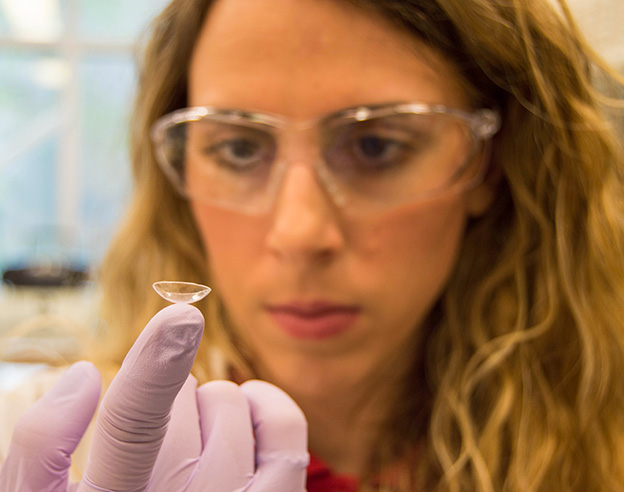Chemical engineer’s contacts could help treat glaucoma

A McMaster PhD candidate has harnessed a component naturally found in tears to develop a contact lens-based drug delivery system for glaucoma patients.
Chemical engineer Myrto Korogiannaki has used hyaluronic acid to help get drugs to the eye from a lens in a controlled way.
Patients with front-of-the-eye diseases, such as glaucoma, traditionally use medicated eye drops twice a day to treat their ailment. But those drops are incredibly inefficient: only about five per cent of the drug they carry actually makes it to the cornea.
“The rest ends up in the skin around the eye or in the bloodstream,” says Korogiannaki. “And that can mean undesired side-effects.”
Contacts, however, are placed directly against the eye, keeping the drugs in contact with the cornea for a much longer period of time.
They can also deliver drugs over the course of many days, meaning patients don’t need to worry about applying drops multiple times each day.
“It’s a much more targeted release of medication,” says Korogiannaki.
It all means that the often-elderly patients are more likely to finish treatment, and get more of their medication where it’s supposed to go.
Diseases of the eye are a significant burden to society. More than a million Canadians live with vision loss, and that number is expected to double over the next 25 years.
Korogiannaki is one of a number of researchers in chemical engineer Heather Sheardown’s lab looking at more effective ways of delivering drugs to both the front and back of the eye.
Sheardown was named Canada Research Chair in Ophthalmic Biomaterials and Drug Delivery Systems earlier this year, and works to develop biomaterials for contact or implanted lenses and new formulas for topical drops.
In 2012, her team developed a microneedle system that could painlessly deliver medication to the back of the eye, sparing patients the excruciating routine of having drugs injected into their eyes by syringe every six to eight weeks.
